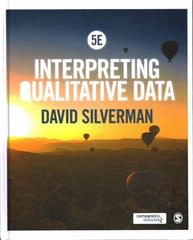Question
An industrial/organizational psychologist and a social psychologist might both be interested in theidea of implicit biases and prejudice. One from an applied psychology standpoint and
An industrial/organizational psychologist and a social psychologist might both be interested in theidea of implicit biases and prejudice. One from an applied psychology standpoint and the other from a basic research standpoint. What are some examples of questions/hypotheses each of theseperspectives might have regarding implicit bias and prejudice? How would each of these psychologists go about investigating these questions and testing these hypotheses?
An industrial/organizational psychologist, approaching the study of implicit biases and prejudice from an applied standpoint, might focus on questions related to workplace diversity and discrimination. They may hypothesize, for instance, whether implicit biases affect hiring decisions or employee evaluations. To investigate this, they could design experiments or conduct field studies within actual organizations, using methods like resume screening simulations, job interview analyses, or surveys to measure the impact of implicit biases on hiring and promotion outcomes. They might also develop, and test interventions aimed at reducing bias in recruitment or performance evaluations to improve workplace equity and diversity. A social psychologist, approaching the topic from a basic research standpoint, might be interested in broader questions about the cognitive and societal processes underlying implicit biases and prejudice. They may hypothesize about the cognitive mechanisms involved in forming and maintaining these biases or how social contexts influence their expression. To investigate, they could use controlled experiments, surveys, and observational studies to delve into the psychological and sociocultural factors that contribute to implicit biases. Their research may not have an immediate practical application but can provide valuable insights into the fundamental nature of bias and prejudice, shedding light on how these phenomena operate in various social contexts
This question stumped me mostly because of the unfamiliar terminology... I had to Google quite a bit for this one. I read this over several times and I can't seem to figure out what it is missing. Did I misunderstand or misread the question? Should I try using more specific examples? There were also quite a few layers to this question so if I missed any parts or need to elaborate on certain points please let me know. Any feedback would be greatly appreciated.
Step by Step Solution
There are 3 Steps involved in it
Step: 1

Get Instant Access to Expert-Tailored Solutions
See step-by-step solutions with expert insights and AI powered tools for academic success
Step: 2

Step: 3

Ace Your Homework with AI
Get the answers you need in no time with our AI-driven, step-by-step assistance
Get Started


